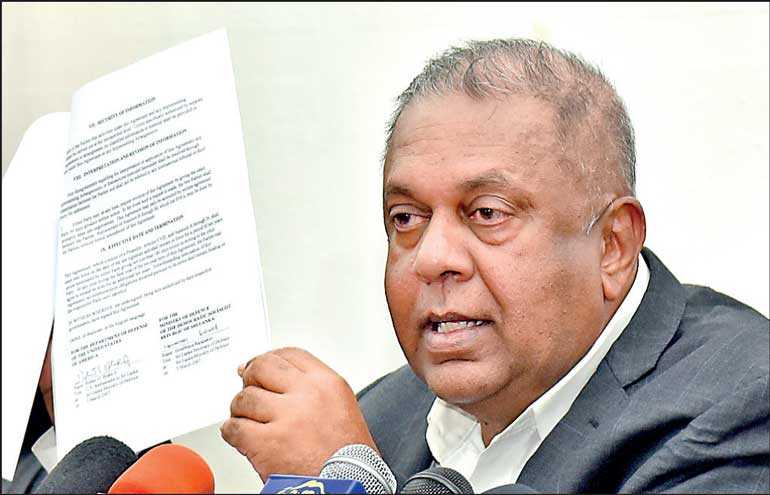Wednesday Feb 25, 2026
Wednesday Feb 25, 2026
Friday, 28 June 2019 00:00 - - {{hitsCtrl.values.hits}}

Finance Minister Mangala Samaraweera yesterday severely criticised the Opposition for what he termed as anti-US fear mongering against signing agreements between the two countries, and warned it could have a significant impact on relations with the US, which is Sri Lanka’s largest single country export partner.
Minister Samaraweera singled out Opposition parliamentarian Wimal Weerawansa for his comments in a media briefing, where he insisted that the Status of Forces Agreement (SOFA) and Acquisition and Cross-Servicing Agreement (ACSA) have been previously signed by former Sri Lankan Governments.
The Minister argued that Weerawansa was on a campaign to spread fear and hate against engagement with the US, which would not be beneficial for Sri Lanka, as the US is Sri Lanka’s largest single country export partner, annually purchasing about $3.7 billion worth of goods and services. The European Union (EU) is Sri Lanka’s largest export partner, and both the EU and the US purchase a large percentage of the output of the country’s $5 billion garment industry.
“The Opposition is jealous of our achievements. We took a country that was isolated and broadened engagement with many international countries. Sri Lanka has benefited from this engagement, whether it is GSP+ or the $480 million grant from the Millennium Challenge Corporation (MCC). I can speak extensively on the MCC grant, because I have been personally involved, and the funds have been allocated by the Government to improve a range of services, including transport and land. The grant may not seem like much, but as a middle-income country, Sri Lanka does not receive such large amounts of funds anymore, and it is important that it be productively used,” he told reporters.
Samaraweera dismissed Weerawansa’s claim that the new versions of the SOFA and ACSA agreements were different and would threaten Sri Lanka’s sovereignty, by pointing out that the documents only had more pages because additional addendums were attached.
“It is ridiculous to say that the agreements are bad for Sri Lanka based on the size of the agreements, or the number of pages. I ask Weerawansa to learn an additional language and come see me, so that I can explain to him what is exactly in these agreements. The first ACSA agreement was signed in 2007 by none other than former Defence Secretary Gotabaya Rajapaksa, so how can he say this agreement is bad? SOFA was signed in 1997 and will only be renewed. What catastrophes have befallen Sri Lanka because of it? Ninety-four other countries, including India and Malaysia, have signed these agreements, and they have used them to engage more and develop their countries. Instead, we are being pushed in the opposite direction by a person who has no idea what they are talking about, a person with a small mind.”
Samaraweera said he stands by the agreements and takes full responsibility, especially for the MCC grant, which will benefit Sri Lanka.
Finance Ministry Advisor Economist Deshal de Mel, responding to questions, said steps to revise Budget 2019 announced earlier will not see major deviations from original projections.
“We will continue to evaluate the situation, and the best adjustments will be made to ensure that we maintain our targets for fiscal balances. We don’t see any major deviations required other than the necessary reprioritisation of expenditure in order to manage targets. There may not necessarily be a complete revision to the Budget itself, the reprioritisation discussions are already ongoing in terms of understanding how much should be adjusted,” he said.